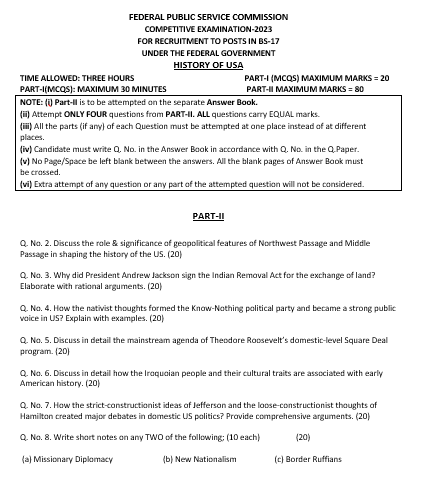History of USA 2023
No. 2. Discuss the role & significance of geopolitical features of Northwest Passage and Middle Passage in shaping the history of the US. (20)
No. 3. Why did President Andrew Jackson sign the Indian Removal Act for the exchange of land? Elaborate with rational arguments. (20)
No. 4. How the nativist thoughts formed the Know-Nothing political party and became a strong public voice in the US? Explain with examples. (20)
No. 5. Discuss in detail the mainstream agenda of Theodore Roosevelt’s domestic-level Square Deal program. (20)
No. 6. Discuss in detail how the Iroquoian people and their cultural traits are associated with early American history. (20)
No. 7. How the strict-constructionist ideas of Jefferson and the loose-constructionist thoughts of Hamilton created major debates in domestic US politics? Provide comprehensive arguments. (20)
No. 8. Write short notes on any TWO of the following; (10 each) (20)
- Missionary Diplomacy
- New Nationalism
- Border Ruffians
Summaries of Questions:
No. 2. Discuss the role & significance of geopolitical features of Northwest Passage and Middle Passage in shaping the history of the US.
The Northwest Passage, a sea route through the Arctic that links the Atlantic and Pacific Oceans, was significant in US history for its potential to open up new trade routes and territorial expansion in the North American region. The Middle Passage, referring to the transatlantic slave trade route from Africa to the Americas, played a crucial role in shaping the demographic, social, and economic landscapes of the US, as it contributed to the development of the plantation economy and the expansion of slavery, which had profound long-term consequences for the nation.
No. 3. Why did President Andrew Jackson sign the Indian Removal Act for the exchange of land? Elaborate with rational arguments.
President Andrew Jackson signed the Indian Removal Act in 1830 to promote the expansion of agricultural lands for white settlers. The law allowed the federal government to negotiate treaties to remove Native American tribes from their ancestral lands in the southeastern US to territories west of the Mississippi River. Jackson justified the policy by arguing it would allow Native Americans to live peacefully in the west, but it was also driven by economic and political motives to open up land for cotton cultivation and settlement.
No. 4. How did the nativist thoughts form the Know-Nothing political party and become a strong public voice in the US? Explain with examples.
Nativism, driven by fears of immigration and concerns about the influence of Catholic immigrants, led to the formation of the Know-Nothing Party in the 1850s. This political party, officially known as the American Party, advocated for restrictions on immigration, naturalization, and the political rights of immigrants. The party gained public support by capitalizing on fears of the growing Irish and German Catholic populations, promoting anti-Catholic and anti-immigrant rhetoric, and calling for policies that prioritized American-born citizens.
No. 5. Discuss in detail the mainstream agenda of Theodore Roosevelt’s domestic-level Square Deal program.
The Square Deal, introduced by President Theodore Roosevelt, was a domestic agenda focused on three key principles: conservation of natural resources, control of corporations, and consumer protection. It aimed to address the needs of the average American by regulating monopolies, ensuring fair business practices, and promoting environmental conservation. Roosevelt’s progressive reforms included antitrust laws, the creation of national parks, and the enforcement of food and drug regulations, which helped shape modern American welfare policies.
No. 6. Discuss in detail how the Iroquoian people and their cultural traits are associated with early American history.
The Iroquoian people, a group of Native American tribes that included the Haudenosaunee (Iroquois Confederacy), played a significant role in early American history. They were known for their sophisticated political system, including a confederation that promoted peace and unity among its member nations. The Iroquois Confederacy influenced American political ideas, particularly concepts of federalism and democracy. Additionally, their agricultural practices, social structures, and strong resistance to European colonization impacted the development of the United States, particularly in regions like New York and the Great Lakes.
No. 7. How the strict-constructionist ideas of Jefferson and the loose-constructionist thoughts of Hamilton created major debates in domestic US politics? Provide comprehensive arguments.
Thomas Jefferson, a strict constructionist, believed in a limited federal government and argued that the Constitution should be interpreted narrowly, limiting government powers to those explicitly stated. In contrast, Alexander Hamilton, a loose constructionist, believed that the federal government should have broad powers to carry out its functions, even if not explicitly outlined in the Constitution. This ideological divide led to the creation of political parties and significant debates over issues such as the establishment of a national bank, federal power, and states’ rights, which shaped early US domestic politics.
No. 8. Write short notes on any TWO of the following:
Missionary Diplomacy
Missionary Diplomacy, promoted by President Woodrow Wilson, was a foreign policy approach that aimed to spread American values of democracy and capitalism while intervening in foreign countries to protect American interests. It emphasized promoting moral standards in foreign relations, especially in Latin America, where Wilson believed the US should guide the region toward political stability and democracy.
New Nationalism
New Nationalism was a political philosophy championed by Theodore Roosevelt, which advocated for a strong federal government to regulate business practices, promote social welfare, and protect the environment. It sought to address the concentration of corporate power, improve working conditions, and ensure the government acted in the public interest, particularly through progressive reforms.
Border Ruffians
Border Ruffians were pro-slavery settlers who crossed the border into Kansas from Missouri in the 1850s to influence the vote on whether Kansas would enter the Union as a free or slave state. They engaged in violent acts and intimidation to ensure Kansas would adopt slavery, contributing to the violent conflict known as “Bleeding Kansas,” a precursor to the Civil War.
